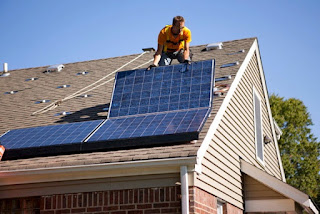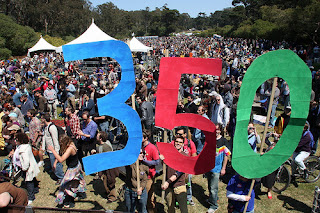Going Solar
Some people insist that solar PV has achieved "grid parity" but to claim this they obviously have to consider grid connected PV.
The real cost of solar PV is masked when grid connected. In order to better understand the real cost of solar PV, let's make a simplified exercise here.
What would be needed to go off grid? The following:
- Obviously, the solar PV panels.
- Storage batteries
- A gasoline electric generator (unless you plan to store heroic amounts of electricity, you would need the backup generator).
We'll consider the following parameters in our installation (feel free to substitute your own numbers):
- Annual solar capacity factor: 18%.
- Cost of the PV installation (including inverters, installation, etc.): $3 per Watt.
- We'll use Tesla storage batteries (the 7kW version) at a cost of $6,000 including installation.
- Solar panel useful life: 20 years.
- Batteries useful life: 10 years.
- Annual electricity usage: 8,400 kWh.
So, this house would consume the following electrical energy in 20 years: 20 x 8,400 = 168,000 kWh.
The average electricity consumption is: 8,400 kWh / 354 / 24 = 959 W.
To supply (on average) that amount of power we need the following PV capacity: 0,959 kW / 0.18 C.F. = 5.3 kW of solar panels. Let's round this off to 6 kW to be on the safe side.
To minimize cost, we'll consider storing only 3 days of electricity, That would be: 8,400 kWh / 365 x 3 = 69 kW. Let's round this off to 70 kW.
We would then need ten 7 kW Tesla batteries at a cost of $6,000 each: 10 x 6,000 = $60,000.
Finally, we'll need a gasoline backup generator at a cost of $1,000.
If we use it 10% of the time, we should be consuming ~$300 of gasoline per year.
So, the total cost to produce 168,000 kWh (in 20 years) would be:
Solar Panels: $18,000
Tesla batteries: $60,000 x 2 = $120,000 (considering the batteries last 10 years).
Backup generator: $1,000
Gasoline: $300 x 20 = $6,000
Total: $145,000
If we divide the above by the total kWh generated in 20 years, we get the cost per kWh:
$145,000 / 168,000 kWh = $0.86 / kWh.
Currently, the average cost of the residential kWh in the US is $0.13, thus the solar kWh as calculated here is 6.6 times more expensive.
Sure, the assumptions above can be modified and the costs will vary, still, once the total costs of solar PV are included it is very doubtful that this technology has reached "grid parity" or that it will achieve it any time soon.
Feel free to double check the numbers above. Thank you.
References:
Average cost of residential kWh in the US:
http://www.eia.gov/electricity/monthly/epm_table_grapher.cfm?t=epmt_5_6_a
Cost of Tesla battery:
http://www.cnbc.com/2015/05/07/teslas-new-bet-a-home-battery-to-slash-energy-costs.html



Comments
Now I know that, when I see the word "solar," it actually means "expensive".
Superb analysis and you're right.
Now if we really knew the environmental impact of making solar panels.
From what I've heard, homes are eventually torn down. I wonder what the environmental and financial impact is of recycling solar panels, if indeed they are recycled.
My thought is that It will generate on what are usually the hottest days when sun shining. Also in winter, the coldest days tend to be clear with sun shining. It would be mounted on the sun exposed part of the roof, which would help decrease heat absorption (not good for winter). Where I live they do not vary the rates (yet) during peak usage, but would be more of an advantage if they did. Also not sure if they buy back surplus, or credit for what is sent to the grid.
Since they've gone so $green$ so have we, we installed a wood stove. Now we burn wood far cheaper than using electricity for our warmth and at -20C and barely any sun - solar and WIND is a joke. One bad freeze up and idle turbines still snap and break apart in cold temps.
Only thing they produce is dead birds and bats! Clever idea, executed in most stupid manner possible... lets see building to building turbines on high-rises where their very presence makes a constant wind tunnel situation with the slightest breeze.
Burning wood makes more pollution than coal plants. Canada is now shipping wood pellets from our forest to feed London's sub (power) stations for their winter heating demand...my my my.
I'm a proud carbon unit! :)